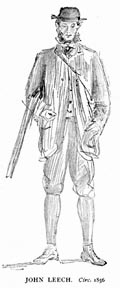[The following passage comes from The Life and Letters of John Everett Millais — George P. Landow]
 Leech, the famous caricaturist of Punch, . . . was a man of whom, if of anybody, one might say,
" I shall not look upon his like again." "The truest gentleman I ever met," was what was said of him by those who knew
him best -- by such judges of men as Thackeray, Trollope,
Frith, Du Maurier, Dean Hole, and others -- and no words
could better convey the sentiments of Millais himself. To
speak of him after his death was always more or less painful
to my father, though now and then, when sport was upper-most in his mind, he would talk enthusiastically of the happy days when they shot or rode together or rollicked about town as gay young bachelors bent on all the amusement they could find.
Leech, the famous caricaturist of Punch, . . . was a man of whom, if of anybody, one might say,
" I shall not look upon his like again." "The truest gentleman I ever met," was what was said of him by those who knew
him best -- by such judges of men as Thackeray, Trollope,
Frith, Du Maurier, Dean Hole, and others -- and no words
could better convey the sentiments of Millais himself. To
speak of him after his death was always more or less painful
to my father, though now and then, when sport was upper-most in his mind, he would talk enthusiastically of the happy days when they shot or rode together or rollicked about town as gay young bachelors bent on all the amusement they could find.
Hear what Du Maurier says of him in Harper's Magazine: —" He was the most sympathetic and attractive person I ever met; not funny at all in conversation, or ever wishing to be, except now or then for a capital story, which he told to perfection.
"The keynote of his character, socially, seemed to be self-effacement, high-bred courtesy, never-failing considera- tion for others. He was the most charming companion conceivable, having intimately known so many important and celebrated people, and liking to speak of them; but one would never have guessed from anything he ever looked or said that he had made a whole nation, male and female, gentle and simple, old and young, laugh as it had never laughed before or since, for a quarter of a century.
He was tall, thin, and graceful, extremely handsome, of the higher Irish type, with dark hair and whiskers and complexion, and very light greyish-blue eyes; but the expression of his face was habitually sad, even when he smiled. In dress, bearing, manner, and aspect he was the very type of the well-bred English gentleman and man of the world and good society. . . . Thackeray and Sir John Millais -- not bad judges, and men with many friends -- have both said that they personally loved John Leech in better than any man they ever knew:"
This, I think, fairly sums up the character of the man whose name . . . figures so often and so prominently in my father's correspondence. It was in 1851 that they first met, and one of the first results of the intimacy that then sprang up between them was Millais' conversion to his friend's view of fox-hunting as one of the finest sports in the world both for man and beast. Hitherto he had insisted that, unlike shooting or fishing, at both of which he was already an expert, hunting was "a barbarous and uncivilised sport," and as such he would have nothing to do with it. But Leech would not listen to this. [I, 261-62]
References
Millais, John Guile. The Life and Letters of John Everett Millais, President of the Royal Academy. 2 vols. New York: Frederick A. Stokes, 1899.
Last modified 18 September 2004